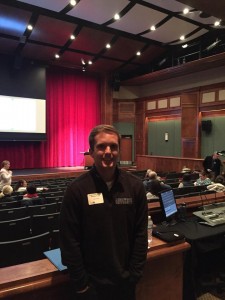Supporting Gender Diverse Youth
 I recently attended the conference Supporting Gender Diverse Youth which was held at Lynchburg College and facilitated by Dr. Laura Farmer. The points of focus that were really helpful to me were introduction to terminology, ethical and values-based considerations, and best counseling practices as they pertained to counselors and their interaction with youth who identify as LGBTQ. It’s important to have a working knowledge of LGBTQ issues and concerns but it’s also important to work towards developing an appropriate manner of interacting with LGBTQ individuals so as to contribute to an overall accepting environment.
I recently attended the conference Supporting Gender Diverse Youth which was held at Lynchburg College and facilitated by Dr. Laura Farmer. The points of focus that were really helpful to me were introduction to terminology, ethical and values-based considerations, and best counseling practices as they pertained to counselors and their interaction with youth who identify as LGBTQ. It’s important to have a working knowledge of LGBTQ issues and concerns but it’s also important to work towards developing an appropriate manner of interacting with LGBTQ individuals so as to contribute to an overall accepting environment.
I found the introduction to terminology to be very important because I identified with the notion that was discussed in that many people are unaware of how to speak to individuals who identify or may be considering identifying as members of the LGBTQ population. We discussed terms that are no longer appropriate and a breadth of terms that recognize individuals with identities that I have never been introduced to before. Most importantly in my opinion, we discussed the value of merely asking individuals “how do you identify?” if we are unsure of how to speak to them or are unsure of how they identify. Sometimes, it may not be as vital to be well-versed in LGBTQ terminology so much as it is to show positive regard towards individuals and a willingness to learn.
Much of the conference was directed with consideration to the practice of school counseling but the implications can be applied to multiple settings. Practices that support LGBTQ youth include respecting their gender identity and expression, using their chosen names, ensuring they are allowed to fully participate in school in ways that are consistent with their gender identity, and to prioritize student privacy. These practices reinforce the need to allow individuals to choose how they are to be a part of their environment and for the people around them to not make impositions upon them instead. For all people who interact with LGBTQ individuals, it is critical to allow them to express themselves and not impose our values upon them if we are to truly create an inclusive environment.
At the conclusion of the conference, we all talked about what we learned and how we can advocate for members of the LGBTQ population whether or not we are in direct contact with LGBTQ individuals in our roles as counselors. Attending this conference was very helpful because it gave me exposure to a population that I did not have much knowledge about but it also helped me learn how best to help this population and advocate on their behalf. Having the basic knowledge that I now have from attending this conference, I feel much more comfortable in terms of my ability to interact with LGBTQ individuals in a counseling role and feel that through continued education, I can really strengthen my competence in this area.
Comments are closed.